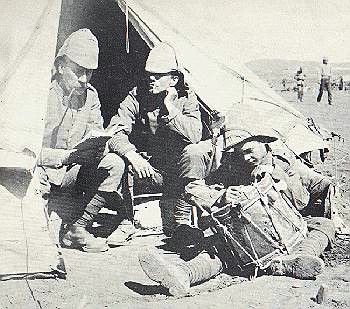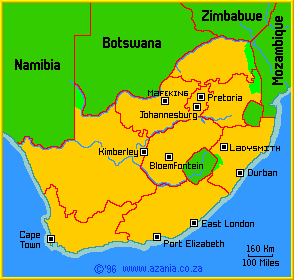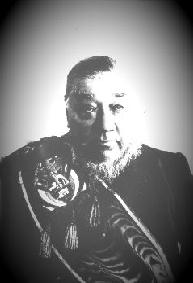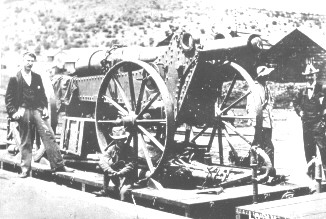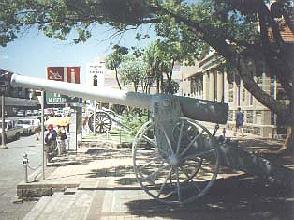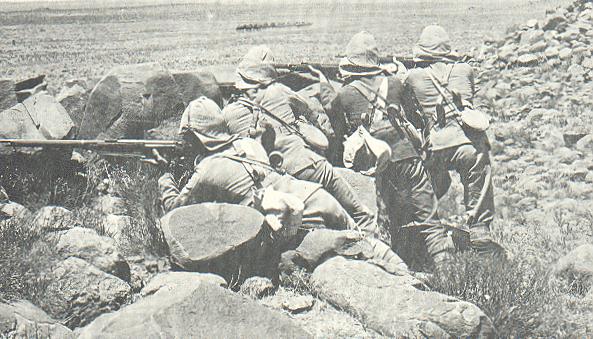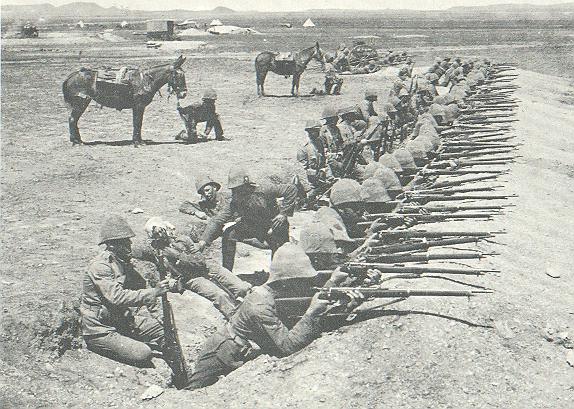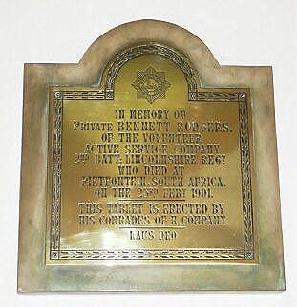|
The Boer War of 1899-1902
The War Memorial in the Wellhead Gardens at Bourne reminds us of the two great wars of the 20th century in which the young men of this town were called to serve and some of the smaller, though no less dangerous, conflicts, of more recent times, such as Malaya and Northern Ireland.
Other wars preceded these but as they were now more than a century ago, and therefore in the dim and distant past and less well recorded, we tend to forget them and yet their effect was equally traumatic on those who fought and on their loved ones at home who waited daily for news of them, fearing that they would be badly hurt and even killed.
These were the men who came forward when more troops were needed to support the campaign against the Boers and on 22nd December 1899, the
Stamford Mercury reported: "The officer commanding has placed H Company, 2nd Volunteer Battalion, Lincolnshire Regiment, at the service of the War Office. We hear that several in Bourne have already volunteered for active service." It was a bit rough while it lasted, the Boers had such a strong position. If we had a force in the same position, it would have taken a very strong enemy to have driven us out. By what I saw of it yesterday, this way of fighting is the most unequal imaginable. The Boers get stuck on the top of the hills; you can't see them; you are lucky if you do. We never saw one of them till we got on the brow of the hill. Then they poked a bit of a white flag up so there was no chance whatsoever of getting our own back. They never expected to have to quit their camp in such a hurry; we could tell that by the condition in which we found it.
Private George Drakard of Bourne, a reservist who had been recalled to the colours at the outbreak of the war, was in the same regiment, the 2nd Battalion, the Coldstream Guards, and he was wounded at Belmont on November 23rd. He wrote home from Wynberg Hospital, Cape Town, on 2nd December 1899: We have everything the heart could wish - fruit and strawberries and good nurses. I can hardly believe it is so near Christmas, the weather is so beautiful and we are close to the sea. This is Monday afternoon, December 2nd. Three funerals have passed by here in the last half hour. No doubt you have read of the three battles we had - Belmont, Graspan and Modder River; not a bad five days' work. I hope the accounts you read were good ones; I know they were good battles and so do many more. The last was the worst. We were under fire from 6 in the morning until 9 at night. I think it is the worst battle that has been fought up to now. You may bet the Boers got it pretty thick. In some places, the trenches were full of dead. They fully deserve what they got. I told you that at Belmont we couldn't see one of them until we had fought through the fire up to their trenches, then, when we see them and are eager to fight man to man, they poke up a white flag. They are not fit to be called men. About five in the afternoon I got hit. I had just put my hand up to my helmet to throw it back ready for another shot when a bullet struck through my left hand. They fired on our ambulance wagons whenever they saw a chance. As I was going off the field in one of the ambulance wagons, the drivers had to whip the mules up as several times their shells fell quite close to us. I don't think they will last out much longer. One of the Boer prisoners after the Belmont battle said: "The more we fire the faster you come on!" They were surprised and disappointed that we did not run away. A fellow guardsman who was also injured in the battle at Belmont was Private S Tipler of the 1st Battalion, the Coldstream Guards, whose widowed mother lived in Eastgate. On 22nd December 1899, he wrote from Modder River to his sister Mrs Lunn, living at Dyke, saying: You have no doubt heard that I was slightly wounded on November 23rd at Belmont. I caught it through the muscle of the right breast. I shall never forget the day. Talk about hailstones; they weren't in it with the shot rattling round our ears. We had a warm time of it. After firing on the Boers, we had to charge them out of the hills with fixed bayonets. They were off like a shot as soon as they saw the steel. They can't face out a fair fight. They are a cowardly lot. They all make for the hills and, as soon as they are routed from them, they all get horses. We can't flank them much as this country is pestered with barbed wire. While I was in hospital, our fellows marched 40 miles and fought three battles. I was out in time for the next set-to on December 11th. I rubbed through that time. But the Highlanders got cut up very much. We have been resting from fighting since then. But the big guns keep dropping a shell now and then. Long Tom [a large siege gun] has just put two lyddites [high explosive shells] into them this morning. The hills are swarmed with Boers. We should only like to attract them into the open plain. The Boers lost very heavily last time. The guns have done wonderful damage but it is awful to see some of our fellows' wounds. It makes your blood run cold to see their legs, arms and heads. I couldn't tell you all. But thank God, mine was not serious. I live in the hope of getting through. It's terrible when Kruger's bullets [Paul Kruger was the Boer leader] are whistling round your heads. It's almost enough to make you bob your head a bit. Then whizz comes a shell bursting amongst us! Nobody knows what it is like, only those who have been through it. I am quite well and in fighting order and hoping to get some of my own again. Tipler was killed in action shortly afterwards, leaving a wife and three young children who were living near the regimental depot in London. Before being called up, he had only just recovered from a long illness and the day he rejoined his regiment, his home was wrecked by fire from which the children were rescued with some difficulty, the youngest being badly burned and was taken to hospital. His case was referred to the War Relief Fund with a request for financial assistance.
No 1192 Private George Tyers, a regular soldier from Bourne, was also serving at the front with H Company, 3rd King's Royal Rifles, and on 23rd January 1900, he wrote from Spearman's Hill in Natal to his sisters, Mrs Garfoot in Manor Lane and Miss M J Tyers, who was living in West Street: I am sorry I could not be with you at Christmas as I promised. I think we shall soon finish this bit of an affair. We have been very busy. In our first fight, we were at it for eight hours under the boiling sun. You seem to get more news at home than we do here. When we landed, the civilians of Natal were very good to us. They gave us tobacco and cigarettes and if we wanted to buy fruit from the natives, they would not allow us but bought us what we wanted. We have had a lot of marching since I wrote last and we are expecting to have a warm reception before we get to Ladysmith. We have been marching through rivers and getting our clothes wet through. We let them dry on us. With having to fight our way through rivers up to the waist, we don't get on very fast. We sleep out at night with our coats to cover us. But we shall get over that. I hope sister is getting on well with her shop and that she will save me some cigarettes. I shall want a cartload to make up for lost time. I don't expect to get a smoke till we get to Ladysmith. When we get near the Boers, I shall get my own back. I owe them something for stopping my furlough [leave]. We have had another bit of a fight. We don't know what will happen next. Cheer up. God bless you all. If I never meet you on earth, I hope we may meet in heaven. Don't be downhearted. We can only do our duty and leave the rest in our Father's hands. He knows what is best. Give my love to all. Cheer up. Private Tyers wrote home again on February 28th, but this time from Colenso, near Ladysmith, to Mrs Fisher of Woodview, Bourne: We have been doing nothing these last ten days only fighting. It is not particularly pleasant to be lying behind a rock all night and all the next day without food or water and to hear the groans now and then of some poor wounded comrades. Only last Friday, a bullet tore half the sole of my shoe off. I am beginning to get old now with losing my back teeth cracking our hard biscuits. We enjoy them though. Tyers was subsequently wounded in action and invalided home from Natal, having taken part in battles at Colenso, Spion Kop, Pieter's Kop and in the 13 days of fighting preceding the relief of Ladysmith on Februrary 28th. He had several narrow escapes and suffered a severe attack of enteric fever [typhoid] at Sunday River and after treatment at a local hospital, he was shipped home. "His narrative of the campaign under General Sir Redvers Buller is extremely interesting and he speaks cheerfully about rejoining his comrades", said the
Stamford Mercury. We have relieved Kimberley [on February 15th after four months] and are on the road to Bloemfontein [capital of the Orange Free State]. We have some stiff fighting and some long day's marches. We keep jolly. I have not been undressed for three weeks now. I need not describe the battles. You will have read of them in the papers before you receive this. We are with [General John] French's Division. You ought to be here to see the fun. It is sport to see the Boers. They look as if a wash would do them good. I shall have a lot to tell you when I come home. I don't think it will be long now. I think they will soon give in. We were all very happy when the Queen sent a telegram to us for doing such good work. By March 31st, Stuffins was in Bloemfontein and writing again to his mother saying: You have no doubt heard of General French's victories and read full accounts of the relief of Kimberley. We had some hard fights and some long day's marches to get there. We were five days marching 100 miles and it was marching too, with the heat and the dust. Kimberley is a very nice place. The people were reduced to eating horseflesh. You may guess how pleased they were when we got there. The Boers had done a lot of damage with their big guns. The women and children were down the mines out of harm's way. When we marched through they cheered us. When we left there we captured [General Pieter] Cronje and seven thousand prisoners and ten guns at Paardeburg and then marched to Bloemfontein. [General Cronje and his Afrikaner (Boer) troops, had been forced to surrender in February 1900]. I think the Boers have had very nearly enough of it. The only place now is Pretoria and then home! I don't think we shall be long now. I am getting on all right. I am getting black with the sun. I expect you could do with a little more sunshine in England now. I shall have a lot to tell you when we come home, if all's well. We shall have a rest then we shall be ready for it. I have not had my clothes off for a month and we sleep out in the open, without tents. Stuffins wrote again to his mother from Bloemfontein on April 6th saying: We are now resting, waiting for fresh horses. When we shift again, it will be straight for Pretoria [in the Transvaal and administrative capital of South Africa] and when the move begins, I shall not have much time for writing. We had a sharp fight on March 28th at Glen, about 20 miles from here. The Boers fired 200 shells at us, killing one man and wounding two. We gave them beans. I am in the best of health, just a little black with the sun. It is very hot here now and they call it winter. I wonder what summer is like? The Lincolns are here now with us but have not had time to see who I know among them. I don't think the war will last much longer. I expect you have seen where U Battery lost their guns. We went with all speed to save them, but we were too late. They took all the men prisoners and shot all their horses. A week later, on April 13th, Stuffins wrote again to his mother from Bloemfontein: I have sent you the Queen's chocolate box and some of the chocolate. [Queen Victoria sent a tin of chocolate bearing her portrait and the royal crest to all soldiers serving in South Africa]. I hope you will take care of it for me until I come home. The Queen sent it to us for a New Year's gift. We did not get it before because we have been on the move. I am sending you a Kruger shilling which you will find in the chocolate box. Please save it for me until I come home. There was a pound of chocolate in the box. It was very good of the Queen to send it to us. They are offering £10 for the chocolate boxes here but none of the men will sell their boxes. I hope you will enjoy the eating of the chocolate and think of me and of the Queen. I expect by the time you get this we shall be on the way to Pretoria. We start from here with 80,000 troops so I think we shall make a good sweep of it. I am in the best of health. I hope you get the chocolate box safely.
Another letter arrived for his mother in November. It had been posted from Rhenoster River where there was still fierce fighting. Stuffins wrote: We had a rough time on September 27th. De Wet [General Christian De Wet, a famous hunter and the most audacious of all the Boer commanders] shelled our camp but he did not do much harm as we were very soon saddled up and after him. One of the 16th Lancers was killed and one of our gunners was wounded in the face but he is going on very well. I don't know when we shall be home but I hope it will be soon. De Wet is the man we want to get hold of. When we have him, the war will soon finish. Stuffins wrote again on November 1st, this time from Ventersburg: We fought another battle on October 29th. We left Ventersburg station and marched 21 miles that night, attacking the Boers' position at daybreak. It was a rough march. It was quite dark. We had been marching all the day before. As soon as dawn broke, there was an awful crash of rifle fire from our infantry. A five-inch gun boomed in between the volleys. The infantry attacked on the north side and we attacked on the south. When daylight appeared, the Boers were surprised to find us round them. Our cavalry rushed to the top of the ridge and stood firing as hard as they could at the retreating enemy. We dashed up at a gallop and came into action with four guns and a pom-pom [a variety of large machine gun using one pound shells] and let them have it. They soon cleared off. I wish they would stand and fight so that we could finish it. We took 60 prisoners and we camped at seven in the morning to rest. We sent all the women out of Ventersburg to Kroonstadt and burnt the town down and all the farms near. Only the day before this, the Boers attacked the line and captured 88 of our men and stopped a train and started to set it on fire. But the armoured train came to the rescue and drove them off. A messenger was sent to us and we went in pursuit. They let all our men go again. This is between Bloemfontein and Kroonstadt. Tomorrow, November 2nd, we start for Bloemfontein. Our mail was in the train they stopped but it was not damaged. I am in the best of health. The sun is very hot here now. I expect you could do with a little of it in Lincolnshire now. Mafeking, a small town in Cape Province on the railway line to Rhodesia, was relieved on May 17th by a flying column riding up from Kimberley and after joining forces with a second one and reinforced by Canadians, quickly broke enemy resistance. The garrison had been under siege since 12th October 1899, but under the command of Colonel
Robert Baden-Powell, later to achieve prominence as founder of the Boy Scout movement, had successfully held out against the Boers for 217 days. There was great rejoicing when the news reached Britain by a Reuters agency message and theatrical productions in London were interrupted for special announcements. At Covent Garden, someone shouted down from the gallery that Mafeking had been relieved as the curtain came down on
Lohengrin and the audience broke into patriotic songs with the Prince of Wales beating time from the royal box. We have just lately had some bad weather. The rain has been very heavy. It would make you open your eyes to see us turn out of our beds in the morning - our beds being the couch of mother earth, and our roof our wagon covers. We have a blanket. To see us in camp when night has fallen would make you wonder. All around, you would see men lying on the top of their harness. Some have used the horse collar for a pillow and some, like runaway Jacob, are happy enough to have a big stone for a pillow. It is a sight, I can tell you. Sludge! There is plenty of that. We are up to the knees in it when grooming the horses. But all's well. We keep cheery. Keep your spirits up. Remember me to all. In June 1900, Lance Corporal Herbert Marsh of the 14th Hussars, son of William Marsh, a postman who lived in Woodview, Bourne, was invalided home from South Africa. He had arrived in Natal early the previous January and was engaged in the fighting up to the relief of the garrison town and rail junction of Ladysmith on February 28th after a siege of 118 days, the 14th Hussars being the first cavalry regiment to enter the beleaguered city. Marsh subsequently saw much active service in the Biggarsberg mountains of Natal, being mainly employed in the dangerous duty of scouting. It was while bearing despatches from Captain Hamilton to the general in command near Reenan's Pass that he was wounded in the left foot by a party of Boers concealed behind rocks. He had already delivered his despatches safely and was on his return journey when shot. His wound was treated at hospital in Ladysmith and he was then shipped back to England. The Stamford Mercury reported: "He is a bright, intelligent young fellow of smart, soldierly appearance. His description of the country and fighting are wonderfully clear and realistic."
Private A Percival, another regular soldier from Bourne, was an infantryman serving with the Bedfordshire Regiment, and he wrote home in August 1900 to his mother, Mrs Clements who lived in Hereward Street, with much cheerfulness and optimism about the progress of the campaign: The Boer resistance will soon be at an end. We have kept them on the move. I hope that we will all soon be back in dear old England. For myself, I am in the very best of health. Little had been heard of the volunteers from Bourne until Lance Corporal Pike, one of the soldiers who had attended the farewell dinner at the Nag's Head, wrote home to his family in West Road in August 1900. He was serving with H Company of the 2nd Volunteer Battalion, the Lincolnshire Regiment, his own unit, but had been wounded and was invalided home in August, receiving a rousing reception from his friends and family in the town. Pike had seen active service at
Bloemfontein and at Kroonstadt where he had become a victim to an attack of enteric fever. He recovered from his illness and returned to Bourne looking bronzed and fit. But before leaving the front, he had applied to join the new mounted police force formed to keep order in the colony by Colonel Robert Baden-Powell who had become a popular hero during the siege of
Mafeking. While on leave, Pike took his final examination and was accepted with the rank of corporal, sailing for South Africa in December to join his new unit. His father, Mr Arthur Pike, later called his house in West Road, Kimberley House. Private Bennett Rodgers, one the soldiers who had volunteered for regular service with the 2nd Lincolnshire Regiment soon after the war started, died from enteric fever at Reitfontein on 23rd January 1901. He was the son of Mr John Rodgers of Eastgate, Bourne, and had been in South Africa for nine months. "He was a finely-built, brave, bright young fellow and the deepest sympathy is felt for his parents", said the Stamford Mercury. The captain commanding his unit wrote a letter of sympathy to Mr Rodgers speaking highly in praise of his conduct: "He stuck to his duty until compelled by fever to fall out of the line of march. He was buried in Reitfontein cemetery, a small cross being erected by the regiment over his grave. The hospitals are now well manned and equipped and you may rest assured that your son received every attention so far as medical skill is concerned, and every comfort."
At this time, another regular soldier, Private Parker, son of Mr Parker of Bedford Cottages, Eastgate, Bourne, was invalided home. He had been serving with the 2nd Battalion, the Coldstream Guards, but had been in hospital after being wounded at Belfast in the Transvaal the previous August. "He has many interesting reminiscences of the war", reported the
Stamford Mercury. "On his return home he received a very hearty welcome from his friends."
The toasts were drunk with much enthusiasm and musical honours and the two soldiers were presented with gifts of tobacco, including one for Private Tewson who did not attend the dinner. Songs were sung and Mr A Rippon's band from Stamford played selections to end the evening of celebration. A silver trophy was presented to H Company by Dr James Watson Burdwood, a local general practitioner and Medical Officer of Health to Bourne Rural District Council. It was known as the Pretoria Cup, to be awarded each year for the highest score in marksmanship on the anniversary of Lord Roberts' entry into Pretoria in September 1900. The first winner was Private George Stennett who received the trophy at a presentation during a smoking concert held by the company at the Foresters' Hall in Billingborough on Saturday 11th February 1902. As a direct result of the war, the Countess of Ancaster suggested that more men in civilian life ought to be trained to handle a rifle in case they were needed for military service in the future and this lead to the formation of the Bourne Rifle Club. The idea was first mooted early in 1902 when the troops were returning from South Africa. A meeting was called at the Drill Hall on Thursday 20th March to consider the formation of a club to be affiliated to the National Rifle Association and to provide instruction and practice in the use of the service rifle, to encourage recruiting for the army and auxiliary forces and to be a reserve for home defence. Mr Henry Chappell, a builder of North Street, provided the use of an old granary adjoining the Bourne Institute in West Street for this purpose and sufficient money was raised to fund the project. The range was ready within two months and an official opening by the Earl of Ancaster, accompanied by Lady Ancaster, was held on Wednesday 28th May 1902, when Lady Ancaster fired one of the first shots and scored a bull's eye. Soldiers from H Company who had served in
the Boer War were selected to represent the regiment at the festivities in
London for the Coronation of King Edward VII on Saturday 13th August 1902.
They were among a detachment of 25 men drawn from each of the eight
companies forming the 2nd Volunteer Battalion, the Lincolnshire Regiment,
who lined the Mall through which the royal procession passed on the return
journey from Westminster Abbey to Buckingham Palace. The men, under the
command of Captain Bell and Lieutenant D S Carter, travelled to and from
London by special train and Captain Bell was also allotted a seat in the
stand at Horse Guards' Parade. The war that began with a string of British defeats, ended on 31st May 1902 after two years and seven months. The Boer leaders arrived in Pretoria to meet Lord Milner, the High Commissioner, and Lord Kitchener, the Commander-in-Chief, and less than an hour before the expiry of the British deadline, at midnight on the last day of May, they signed the terms of surrender although the announcement did not become public in London until the next day which was a Sunday. The news reached Bourne on Monday 2nd June and there were demonstrations in the market place where bonfires were lit and blazing tar barrels rolled down the road. The police were called out and 29 people were arrested. H Company, 2nd Volunteer Battalion, the Lincolnshire Regiment, had provided 28 active service soldiers for the campaign and 22 arrived home safely. On Wednesday 6th August 1902, each member of the company was honoured with the presentation of a silver tobacco box bearing an inscription referring to the occasion on which it was made. The ceremony took place in the Market Place amid a large crowd when the gifts were presented by Mrs R A Gardner, whose husband was chairman of the reception committee. A dinner was then held in the Corn Exchange when the vicar, the Rev Hugh Mansfield, toasted the unit. "The work of the active service men has been honourable work for which they have gained the admiration of their country", he said. "The men responded to their country's call and the country appreciated their services. When it was found that the regulars were not sufficient to ensure success, it was then that the volunteers so splendidly responded. There have been faults in the conduct of the war but Tommy Atkins has escaped this criticism. We are glad to see them back and we envy them because they have done such a great duty which kept the flag of old England still waving on to victory." Yates, now a lance-corporal, thanked the reception committee for the hearty manner in which they had been received home and the evening ended with music and songs. Another regular soldier from Bourne, Private William Glenn, returned home safely after serving in South Africa with the 2nd Northumberland Fusiliers. On Monday13th October 1902, he attended a presentation at the Eastgate School under the chairmanship of the vicar, the Rev Hugh Mansfield, supported by George Mays, chairman of Bourne Urban District Council, and other dignitaries. The chairman referred to the campaigns through which Private Glenn had passed and added: "It gives me great pleasure that he has returned home without a scratch. I am always thankful to hear of soldiers that have fought for me because when they fight for their country I consider they are fighting for me and we wish to show our appreciation of the services he has given with these articles to which we have all subscribed." Private Glenn was then presented with a silver watch and chain, a pipe, a cigarette holder, tobacco and a scarf pin. Two of Lord Ancaster's sons, Major Charles Willoughby and Captain Claud Willoughby, who had been on active service in South Africa, returned home on Tuesday 4th November 1902. They arrived at Bourne station by the 5.50 pm train and received a hearty reception from H Company who turned out in force together with a contingent of the Imperial Yeomanry. The Volunteer band played "See the conquering hero comes" and the route from the station was lined with cheering people. Major Willoughby gave a brief speech of thanks before he and his brother were escorted by torchlight procession through the streets with the band playing "For he's a jolly good fellow" before leaving for Grimsthorpe Castle escorted by a small contingent of troops from the two units. The silver tobacco boxes however cost more than the reception committee had allocated for this purpose and the debt was still outstanding in the summer of 1904 when Captain Bell attempted to raise money towards the deficiency of £20 by holding a garden fete in the grounds of his home at Bourne House in West Street on Wednesday 24th August. The attractions included a stall of work, croquet and tennis matches in the afternoon and a promenade concert and dancing in the evening, and at dusk, the grounds were illuminated with fairy lamps and Chinese lanterns. The music was provided by the band of H Company with Mr J H Berry at the piano and there were afternoon teas and refreshments in the evening. A large number of people attended and £6 10s was raised from gate money for the benefit of the fund. See also The peace celebrations in Bourne - 29 arrested Bourne Volunteers Bourne honours a Boer War general Bourne rifle range Charles Stuffins Herbert Stennett Thomas Mays The Cliffe family Note: Compiled with the help of contemporary news reports from the
Stamford Mercury and elsewhere.
Go to: Main Index Villages Index
|
||||||||||||
